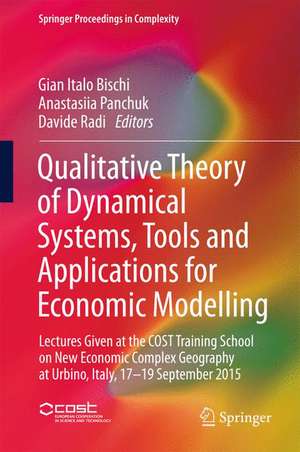Qualitative Theory of Dynamical Systems, Tools and Applications for Economic Modelling: Lectures Given at the COST Training School on New Economic Complex Geography at Urbino, Italy, 17-19 September 2015: Springer Proceedings in Complexity
Editat de Gian Italo Bischi, Anastasiia Panchuk, Davide Radien Limba Engleză Hardback – 3 iun 2016
Economic and social systems are intrinsically dynamic, characterized by interdependence, nonlinearity and complexity, and these features can only be approached using a qualitative analysis based on the study of invariant sets (equilibrium points, limit cycles and more complex attractors, together with the boundaries of their basins of attraction), which requires a trade-off between analytical, geometrical and numerical methods. Even though the early steps of the qualitative theory of dynamical systems have been incontinuous time models, in economic and social modelling discrete time is often used to describe event-driven (often decision-driven) evolving systems.
The book is written for Ph.D. and master’s students, post-doctoral fellows, and researchers in economics or sociology, and it only assumes a basic knowledge of calculus. However it also suggests some more advanced topics.
| Toate formatele și edițiile | Preț | Express |
|---|---|---|
| Paperback (1) | 946.72 lei 6-8 săpt. | |
| Springer International Publishing – 30 mai 2018 | 946.72 lei 6-8 săpt. | |
| Hardback (1) | 952.89 lei 6-8 săpt. | |
| Springer International Publishing – 3 iun 2016 | 952.89 lei 6-8 săpt. |
Din seria Springer Proceedings in Complexity
- 20%
 Preț: 1128.80 lei
Preț: 1128.80 lei - 18%
 Preț: 1240.16 lei
Preț: 1240.16 lei - 18%
 Preț: 1214.09 lei
Preț: 1214.09 lei -
 Preț: 497.13 lei
Preț: 497.13 lei - 18%
 Preț: 1112.30 lei
Preț: 1112.30 lei - 18%
 Preț: 1300.10 lei
Preț: 1300.10 lei - 20%
 Preț: 1084.83 lei
Preț: 1084.83 lei - 18%
 Preț: 1393.27 lei
Preț: 1393.27 lei - 18%
 Preț: 961.55 lei
Preț: 961.55 lei - 20%
 Preț: 646.95 lei
Preț: 646.95 lei - 15%
 Preț: 641.71 lei
Preț: 641.71 lei - 18%
 Preț: 1395.32 lei
Preț: 1395.32 lei - 20%
 Preț: 646.12 lei
Preț: 646.12 lei - 20%
 Preț: 571.27 lei
Preț: 571.27 lei - 20%
 Preț: 1288.76 lei
Preț: 1288.76 lei - 18%
 Preț: 1125.55 lei
Preț: 1125.55 lei - 15%
 Preț: 643.34 lei
Preț: 643.34 lei - 18%
 Preț: 947.04 lei
Preț: 947.04 lei - 24%
 Preț: 839.38 lei
Preț: 839.38 lei - 18%
 Preț: 1251.98 lei
Preț: 1251.98 lei - 18%
 Preț: 1670.11 lei
Preț: 1670.11 lei - 18%
 Preț: 1223.25 lei
Preț: 1223.25 lei - 18%
 Preț: 974.04 lei
Preț: 974.04 lei - 15%
 Preț: 646.11 lei
Preț: 646.11 lei - 18%
 Preț: 1225.16 lei
Preț: 1225.16 lei - 15%
 Preț: 645.79 lei
Preț: 645.79 lei - 18%
 Preț: 957.32 lei
Preț: 957.32 lei - 20%
 Preț: 984.18 lei
Preț: 984.18 lei - 15%
 Preț: 643.84 lei
Preț: 643.84 lei - 15%
 Preț: 644.63 lei
Preț: 644.63 lei - 18%
 Preț: 1236.51 lei
Preț: 1236.51 lei - 18%
 Preț: 1223.25 lei
Preț: 1223.25 lei - 18%
 Preț: 964.86 lei
Preț: 964.86 lei - 18%
 Preț: 1278.82 lei
Preț: 1278.82 lei - 18%
 Preț: 1217.41 lei
Preț: 1217.41 lei - 24%
 Preț: 1067.23 lei
Preț: 1067.23 lei -
 Preț: 424.99 lei
Preț: 424.99 lei - 18%
 Preț: 1236.69 lei
Preț: 1236.69 lei - 20%
 Preț: 1277.57 lei
Preț: 1277.57 lei -
 Preț: 424.81 lei
Preț: 424.81 lei - 24%
 Preț: 1084.90 lei
Preț: 1084.90 lei
Preț: 952.89 lei
Preț vechi: 1162.06 lei
-18% Nou
Puncte Express: 1429
Preț estimativ în valută:
182.38€ • 189.69$ • 152.84£
182.38€ • 189.69$ • 152.84£
Carte tipărită la comandă
Livrare economică 14-28 martie
Preluare comenzi: 021 569.72.76
Specificații
ISBN-13: 9783319332741
ISBN-10: 3319332740
Pagini: 250
Ilustrații: XVI, 327 p. 171 illus., 41 illus. in color.
Dimensiuni: 155 x 235 x 21 mm
Greutate: 0.66 kg
Ediția:1st ed. 2016
Editura: Springer International Publishing
Colecția Springer
Seria Springer Proceedings in Complexity
Locul publicării:Cham, Switzerland
ISBN-10: 3319332740
Pagini: 250
Ilustrații: XVI, 327 p. 171 illus., 41 illus. in color.
Dimensiuni: 155 x 235 x 21 mm
Greutate: 0.66 kg
Ediția:1st ed. 2016
Editura: Springer International Publishing
Colecția Springer
Seria Springer Proceedings in Complexity
Locul publicării:Cham, Switzerland
Cuprins
Qualitative Methods in Continuous and Discrete Dynamical Systems.- Some Aspects on Global Analysis of Discrete Time Dynamical.- Dynamical Analysis of Cournot Oligopoly Models: Neimark-Sacker bifurcation and Related Mechanisms.- Some Dynamical Models in Regional Economics: Economic Structure and Analytic Tools.- Dynamic Modeling in Renewable Resource Exploitation.- Dynamic Models of Financial Markets with Heterogeneous Agents.- A Dynamical Model of Proximal Development: Multiple Implementations.
Textul de pe ultima copertă
The book presents the lectures delivered during a short course held at Urbino University in summer 2015 on qualitative theory of dynamical systems, included in the activities of the COST Action IS1104 “The EU in the new economic complex geography: models, tools and policy evaluation”. It provides a basic introduction to dynamical systems and optimal control both in continuous and discrete time, as well as some numerical methods and applications in economic modelling.
Economic and social systems are intrinsically dynamic, characterized by interdependence, nonlinearity and complexity, and these features can only be approached using a qualitative analysis based on the study of invariant sets (equilibrium points, limit cycles and more complex attractors, together with the boundaries of their basins of attraction), which requires a trade-off between analytical, geometrical and numerical methods. Even though the early steps of the qualitative theory of dynamical systems have been incontinuous time models, in economic and social modelling discrete time is often used to describe event-driven (often decision-driven) evolving systems.
The book is written for Ph.D. and master’s students, post-doctoral fellows, and researchers in economics or sociology, and it only assumes a basic knowledge of calculus. However it also suggests some more advanced topics.
Economic and social systems are intrinsically dynamic, characterized by interdependence, nonlinearity and complexity, and these features can only be approached using a qualitative analysis based on the study of invariant sets (equilibrium points, limit cycles and more complex attractors, together with the boundaries of their basins of attraction), which requires a trade-off between analytical, geometrical and numerical methods. Even though the early steps of the qualitative theory of dynamical systems have been incontinuous time models, in economic and social modelling discrete time is often used to describe event-driven (often decision-driven) evolving systems.
The book is written for Ph.D. and master’s students, post-doctoral fellows, and researchers in economics or sociology, and it only assumes a basic knowledge of calculus. However it also suggests some more advanced topics.
Caracteristici
Includes supplementary material: sn.pub/extras























